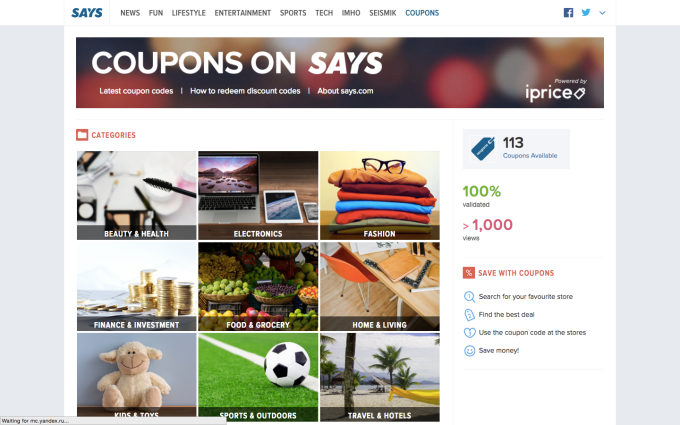iPrice, the e-commerce startup that wants to be the gateway to online retail in Southeast Asia, is back in the money after raising $1.2 million.
Asia Venture Group (AVG) — which financed the company’s previous $550,000 raise — led the round, which also saw participation from 500 Startups’ ‘500 Durians’ fund for Southeast Asia, IMJ, Venturra, F2 Capital and Starstrike Ventures.
That’s not quite all. iPrice, which makes its money sending traffic to e-commerce services and helping consumers pick through a multitude of services in seven countries, has also hired a new CEO. David Chmelar, who was previously with the Boston Consulting Group and most recently was a board member at Wuestenrot Bank in the Czech Republic, has taken the hot seat. Heinrich Wendel, the former Microsoft Seattle product manager who was the founding CEO, is moving to a more hands-on role.
“Heinrich is still here and is absolutely a key person, but now that we are 70 [staff] — and [will] soon [be] close to 100 — it requires additional management capacity so that Heinrich can ensure sufficient focus on the product,” Chmelar told TechCrunch in an interview.
Chmelar, who said he was looking for a challenge in a growth market following time spent in Europe and Canada, explained that the company is moving into new areas. Beyond its website, which is designed to help visitors find the best prices for products across multiple online retail sites, iPrice is also working with publishers to offer coupons.
Its coupon program is being run with a selection of partners that includes Says.com in Malaysia and news site Rappler in the Philippines. Those publishers are using coupon pages — which are whitelabelled from iPrice — to offer e-commerce services to their readers.

iPrice-powered coupons on Says.com
That experience, Chmelar said, is designed to be about product discovery, whereas the main site is about providing an almost directory-like experience for finding specific items. In both cases, iPrice takes a cut of any sales generated by visitors clicking its links, but it shares those fees with publishers. Chmelar declined to disclose the specifics of iPrice’s monetization and its revenue sharing agreement with partners.
In addition to hiring “across the board” — Chmelar said the iPrice headcount could double over the next year — the company is also working to improve its mobile web design. While mobile accounts for more than half of iPrice’s traffic, there’s no plan to produce standalone mobile apps. That’s because “people are still searching for products on google [and iPrice] transfers traffic to merchants, many of which don’t have an app,” Chmelar explained.
iPrice claims to offer 15 million products from over 150 “direct” partners. That’s up from three million products when we spoke to Wendel when the company raised its first funding back in May. Chmelar told TechCrunch that he wants to see the current numbers doubled during the next quarter.
“We’ve been getting great traction and have built a very solid base and good base number of merchants,” he added. “By mastering our mobile presence, iPrice can truly become the consumer brand for online shopping that we envision it to be.”
